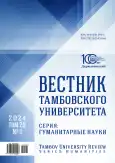Analysis of the verbal image of Russia and Russians in the process of teaching RFL
- Authors: Goncharova E.I.1
-
Affiliations:
- Herzen State Pedagogical University of Russia
- Issue: Vol 29, No 1 (2024)
- Pages: 143-150
- Section: THEORY AND METHODS OF TEACHING RUSSIAN AS A FOREIGN LANGUAGE
- URL: https://bakhtiniada.ru/1810-0201/article/view/297952
- DOI: https://doi.org/10.20310/1810-0201-2024-29-1-143-150
- ID: 297952
Cite item
Full Text
Abstract
Importance. The development of a positive attitude towards Russia and its inhabitants is a priority task for a teacher of Russian as a foreign language. It seems necessary to carry out purposeful work in creating a system of verbal images of Russia and Russians in the representation of foreign students. The purpose of the study is to explore the theoretical prerequisites for studying the verbal image and describing the components of the verbal image of Russia and Russians among foreign students.Materials and Methods. The results analysis of a survey conducted among international undergraduate students at the Institute of Russian as a Foreign Language of the Herzen Russian State Pedagogical University revealed the components of the verbal image of Russia. The data obtained are taken into account when teaching Russian as a foreign language to form a positive image of the country.Results and Discussion. The results analysis of the first survey of foreign students revealed negative associations in the minds of foreigners, which must be corrected, as they reduce motivation to master the Russian language. The results of the second survey of foreign students after training demonstrate the presence of positive verbal images in their minds, proving the effectiveness of the training.Conclusion. The results obtained in the course of the study have theoretical and practical significance, as they enable a teacher of Russian as a foreign language to predict possible negative verbal images of Russia among foreign students, take them into account when teaching Russian to foreigners and, thereby, make the process more effective.
About the authors
E. I. Goncharova
Herzen State Pedagogical University of Russia
Author for correspondence.
Email: ekaterina.goncharova1@mail.ru
ORCID iD: 0000-0002-9937-2423
Assistant at the Russian as a Foreign Language and Methods of Its Teaching Department
48 Moika Emb., St. Petersburg, 191186, Russian FederationReferences
- Dmitrieva E.L. (2019). Obraz Rossii v Kazakhstane i Kazakhstana v Rossii cherez prizmu so-tsiologicheskikh oprosov [The image of Russia in Kazakhstan and Kazakhstan in Russia through the prism of sociological sur-veys]. Rossiya i musul’manskii mir = Russia and the Moslem World, no. 1 (311), pp. 29-32. https://elibrary.ru/sveyqt
- Zheltukhina M.R., Paramonova D.V. (2020). Image of Russia in the coronavirus era: verbal American, British, and Spanish media broadcast. Aktual’nye problemy filologii i pedagogicheskoi lingvistiki = Current Issues in Philology and Pedagogical Linguistics, no. 3, pp. 22-32. https://doi.org/10.29025/2079-6021-2020-3-22-32, https://elibrary.ru/kkyycj
- Dzyuba E.V. (2021). Obraz Rossii v aspekte lingvodidaktiki [The image of Russia in the aspect of linguodidac-tics]. Sbornik nauchnykh statei 5 Mezhdunarodnogo simpoziuma, vklyuchennogo v programmu Mezhdunarod-nogo festivalya «Velikoe russkoe slovo» «Russkii yazyk v polikul’turnom mire»: v 2 t. [Collection of Scientific Works of the 5th International Symposium, Included in the Program of the International Festival “Great Russian Word” “Russian Language in a Multicultural World”]. Simferopol, V.I. Vernadsky Crimean Federal University Publ., vol. 2, pp. 281-286. https://elibrary.ru/jxzkgp
- Zherebilo T.V. (2010). Slovar’ lingvisticheskikh terminov [Dictionary of Linguistic Terms]. Nazran, LLC “Pili-griM”, 486 p. https://elibrary.ru/rusouc
- Timofeev L.I., Turaev S.V. (1974). Slovar’ literaturovedcheskikh terminov [Dictionary of Literary Terms]. Mos-cow, Prosveshchenie Publ., 509 p.
- Zemskov V.B. (2015). Obraz Rossii v sovremennom mire i inye syuzhety [The Image of Russia in the Modern World and Other Subjects]. Moscow, St. Petersburg, Center for Humanitarian Initiatives Publ., Gnozis Publ., 343 p.
- Kyshtymova I.M., Seyuba E. (2022). The image of Russia and Russians: features of perception youth of Russia and Zambia. Baikal Research Journal, vol. 13, no. 3, art. 28. https://doi.org/10.17150/2411-6262.2022.13(3).28, https://elibrary.ru/njawhc
- Tazhibaeva S.M., Abanova A.B., Kishenova A.Yu. (2021). The role of the wordship in the creation of the art world. Arkhivarius = Archivarius, vol. 7, no. 1 (55), pp. 50-52. https://elibrary.ru/ahrciw
- Popkov V.D. (2002). Stereotypes and prejudices: their impact on intercultural communication. Zhurnal sotsiolo-gii i sotsial’noi antropologii = The Journal of Sociology and Social Anthropology, vol. 5, no. 3, pp. 178-191. https://elibrary.ru/oprnpf
- Aseeva K.V., Pupina Yu.G. (2022). Realities in language and culture. Vestnik Moskovskoi mezhdunarodnoi aka-demii = Bulletin of the Moscow International Academy, no. 1, pp. 94-99. https://elibrary.ru/vwvloh
- Ter-Minasova S.G. (2000). Yazyk i mezhkul’turnaya kommunikatsiya [Language and Intercultural Communica-tion]. Moscow, Slovo Publ., 264 p. https://elibrary.ru/yqozjo
- Goncharova E.I. (2023). The image of Russia in the representation of foreign students. Vysshee obrazovanie segodnya = Higher Education Today, no. 3, pp. 123-129. https://doi.org/10.18137/RNU.HET.23.03.P.123, https://elibrary.ru/cwinhe
- Slavina V.A. (2018). Representation of the image of Russia in the Spanish press. Prepodavatel’ XXI vek [Teach-er of the 21st Century], no. 4-2, pp. 444-450. https://elibrary.ru/poivdn
- Chehn Qi. (2020). Obraz Rossii v kul’ture sovremennogo Kitaya [The Image of Russia in the Culture of Modern China]. Khabarovsk, FESTU Publ., 100 p.
- Passov E.I., Kibireva L.V., Kollarova E. (2007). Kontseptsiya kommunikativnogo inoyazychnogo obrazovaniya [The Concept of Communicative Foreign Language Education]. St. Petersburg, Zlatoust Publ., 200 p. https://elibrary.ru/zuznyh
- Prokhorov Yu.E. (2008). Natsional’nye sotsiokul’turnye stereotipy rechevogo obshcheniya i ikh rol’ v obu-chenii russkomu yazyku inostrantsev [National Sociocultural Stereotypes of Verbal Communication and Their Role in Teaching Russian to Foreigners]. Moscow, URSS Publ., 224 p. https://elibrary.ru/qtkunl
- Senina E.V. (2017). The image of Russia and Russians in the “Travel notes about new Russia” by Qu Qiubo. Problemy Dal’nego Vostoka = Far Eastern Studies, no. 4, pp. 158-166. https://elibrary.ru/zcmwot
- Ter-Minasova S.G. (2019). Russkii kak inostrannyi (RKI) – on russkii ili inostrannyi? [Russian as a foreign lan-guage (RKI) – is it Russian or foreign?]. Sbornik nauchnykh i uchebno-metodicheskikh trudov [Collection of Scientific and Educational Works]. Moscow, LLC “KDU Publishing House”, Universitetskaya kniga Publ., issue 16, pp. 5-15. https://elibrary.ru/fhnqbu
Supplementary files








